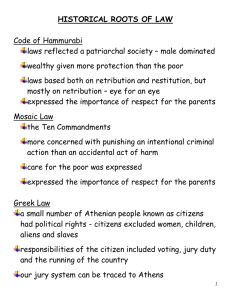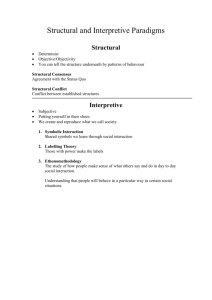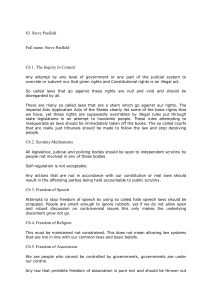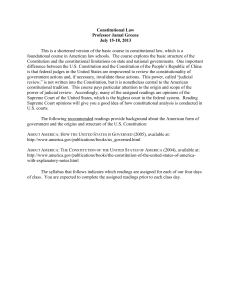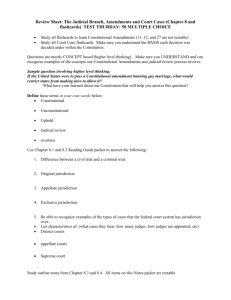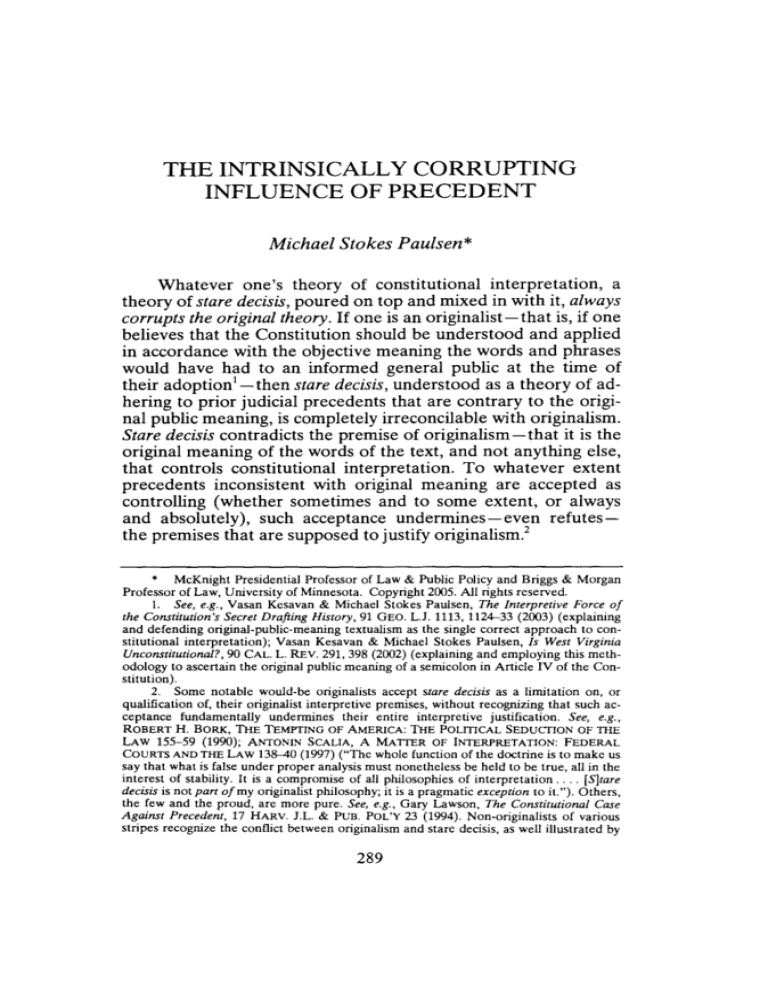
THE INTRINSICALLY CORRUPTING
INFLUENCE OF PRECEDENT
Michael Stokes Paulsen*
Whatever one's theory of constitutional interpretation, a
theory of stare decisis, poured on top and mixed in with it, always
corrupts the original theory. If one is an originalist-that is, if one
believes that the Constitution should be understood and applied
in accordance with the objective meaning the words and phrases
would have had to an informed general public at the time of
their adoption 1 -then stare decisis, understood as a theory of adhering to prior judicial precedents that are contrary to the original public meaning, is completely irreconcilable with originalism.
Stare decisis contradicts the premise of originalism- that it is the
original meaning of the words of the text, and not anything else,
that controls constitutional interpretation. To whatever extent
precedents inconsistent with original meaning are accepted as
controlling (whether sometimes and to some extent, or always
and absolutely), such acceptance undermines-even refutesthe premises that are supposed to justify originalism?
* McKnight Presidential Professor of Law & Public Policy and Briggs & Morgan
Professor of Law, University of Minnesota. Copyright 2005. All rights reserved.
I. See, e.g., Vasan Kesavan & Michael Stokes Paulsen, The Interpretive Force of
the Constitution's Secret Drafting History, 91 GEO. L.J. 1113, 1124-33 (2003) (explaining
and defending original-public-meaning textualism as the single correct approach to constitutional interpretation); Vasan Kesavan & Michael Stokes Paulsen, Is West Virginia
Unconstitutional?, 90 CAL. L. REv. 291, 398 (2002) (explaining and employing this methodology to ascertain the original public meaning of a semicolon in Article IV of the Constitution).
2. Some notable would-be originalists accept stare decisis as a limitation on, or
qualification of, their originalist interpretive premises, without recognizing that such acceptance fundamentally undermines their entire interpretive justification. See, e.g.,
ROBERT H. BORK, THE TEMPTING OF AMERICA: THE POLffiCAL SEDUCfiON OF THE
LAW 155-59 (1990); ANTONIN SCALIA, A MATTER OF INTERPRETATION: FEDERAL
CoURTS AND THE LAW 138--40 (1997) ("The whole function of the doctrine is to make us
say that what is false under proper analysis must nonetheless be held to be true, all in the
interest of stability. It is a compromise of all philosophies of interpretation .... [S]tare
decisis is not pan of my originalist philosophy; it is a pragmatic exception to it."). Others,
the few and the proud, are more pure. See, e.g., Gary Lawson, The Constitutional Case
Against Precedent, 17 HARV. J.L. & PUB. PoL'Y 23 (1994). Non-originalists of various
stripes recognize the conflict between originalism and stare decisis, as well illustrated by
289
290
CONSTITUTIONAL COMMENTARY
[Vol. 22:289
If one is a non-originalist, pragmatist, or otherwise outcome-driven "interpreter" of the Constitution-that is, if one believes that the Constitution should be interpreted in such a manner as to produce justice, good outcomes, or workable and fair
solutions to social and political problems, and not be inhibited
by the constraints of constitutional text, structure, and historystare decisis corrupts and undermines such an interpretive theory, too. After all, why should an interpreter be bound by precedents that stand in the way of one's conception of justice if one is
not bound by the language and original meaning of the Constitution itself? It would be silly to let errant (on these criteria), unjust precedents block the way, especially if the Constitution itself
is not allowed to do so.
One can, I submit, play this parlor game with any and every
theory of constitutional interpretation. If one has a theory of
stare decisis that permits precedent decisions to have genuine
decision-altering weighe -that is, if precedents dictate different
results than the interpreter otherwise would reach in the absence
of such precedents- then stare decisis corrupts the otherwise
"pure" constitutional decision-making process. This rule (may I
call it "Paulsen's Rule"?) cuts across all different interpretive
methodologies. Posit an approach to constitutional interpretation that yields what, on that theory, is the correct interpretation
of the Constitution. 4 Then, add a theory of stare decisis that accords decision-altering force to precedents that would otherwise
the contributions of Professor Merrill and Professor Strauss in this issue. Thomas W.
Merrill, Originalism, Stare Decisis and the Promotion of Judicial Restraint, 22 CONST.
COMMENT. 271, 274 (2005) (preferring to tilt toward precedent and away from originalism for "conservative" policy reasons of promoting a style of judging that produces "fewest surprises"); David Strauss, Originalism, Precedent, and Candor, 22 CONST.
COMMENT. 299 (2005) (preferring precedent to originalism for "liberal" policy reasons
(but probably preferring liberal policy to precedent, too)).
3. I concede the possibility-and believe it often to be the reality-that invocation
of precedent is merely a ruse, intentionally or unintentionally, and never exerts genuine
restraining effect on an interpreter in a subsequent case. See Michael Stokes Paulsen,
Captain James T. Kirk and the Enterprise of Constitutional Interpretation: Some Modest
Proposals from the Twenty-third Century, 59 ALB. L. REV. 671, 679-S1 (1995) (noting
that invocation of stare decisis is often "a hoax designed to provide cover for a particular
outcome, not a genuine, principled ground of decision."). My argument in the text assumes (at least for the sake of argument) the situation where precedent is honestly invoked and has real decision-altering weight. In such a case, I argue that stare decisis corrupts whatever other interpretive theory it modifies. In any other case, "stare decisis is
simply irrelevant, or deceptive: a court that invokes the doctrine to justify a decision it
was prepared to reach on other grounds is adding a makeweight, or using the doctrine as
a cover for its judgment on the merits." Michael Stokes Paulsen, The Irrepressible Myth
of Marbury, 101 MICH. L. REv. 2706,2732 (2003) [hereinafter Marbury].
4. I address presently the "but-there-arc-no-right-answers-to-constitutional-questions"
canard/objection. See infra text accompanying note 18.
2005]
CORRUPTING INFLUENCE OF PRECEDENT 291
be thought wrong under that approach to constitutional interpretation. The result is a deviation from the (by hypothesis) correct
interpretation of the Constitution.
This should be a source of considerable concern to the defender of the interpretive theory in question (whatever it is).
Stare decisis not only impairs or corrupts proper constitutional
interpretation. Stare decisis is unconstitutional, precisely to the
extent that it yields deviations from the correct interpretation of
the Constitution! It would have judges apply, in preference to
the Constitution, that which is not consistent with the Constitution. That violates the premise on which judicial review rests, as
set forth in Marbury. If one accepts the argument for judicial review in Marbury as being grounded, correctly, in the supremacy
of the Constitution (correctly interpreted) over anything inconsistent with it, and as binding the judiciary to enforce and apply
the Constitution (correctly interpreted) in preference to anything inconsistent with it, then courts must apply the correct interpretation of the Constitution, never a precedent inconsistent
with the correct interpretation. It follows, then, that if Marbury
is right (and it is), stare decisis is unconstitutional.5
There is one possible exception to this conclusion, and a few
possible variations on it. You've probably been thinking of one
or another of them already, loading up to refute Paulsen's Rule.
The exception is a theory of constitutional interpretation that
purports to regard judicial precedents as themselves constitutive
of constitutional meaning. That is, past judicial decisions actually
do define the meaning of the Constitution. Under such a theory,
our written Constitution operates much like an unwritten constitution would. (Such an interpretive theory for a written constitution is deeply problematic on other grounds, but I pass over
those deeper problems for present purposes. 6 ) The Constitution's meaning is determined by judicial precedents interpreting
it, in kind of a "common law"-ish sense. The most prominent
(and best) academic theorist of such a "common law" method of
constitutional interpretation is Professor David Strauss. 7 (This is
5. This is a generalization of an argument earlier sketched by Professor Gary Lawson. Lawson, supra note 2. For a thorough defense, see Paulsen, Marbury, supra note 3,
at 2731-34. Marbury is right (on this point) not because it is a revered precedent, but be·
cause it is right on uncorrupted originalist interpretive principles. See id. at 2733 n.78.
6. For a discussion, see Kesavan & Paulsen, The Interpretive Force of the Constitu·
tion's Secret Drafting History, supra note 1, at 1127-33; see also Paulsen, Marbury, supra
note 3, at 2739-42.
7. David A. Strauss, Common Law Constitutional Interpretation, 63 U. CHI. L.
REV. 877 (1996).
292
CONSTITUTIONAL COMMENTARY
[Vol. 22:289
not quite an accurate description of the common law method, either, which does not, at least not in its pure form, treat judicial
decisions as creating the law, but as evidence of the accepted understanding of the law. 8 But this too is largely beside the main
point here, and so I pass this point quickly too. My main point
here is to show that such a theory is self-defeating-an illustration of Paulsen's Rule rather than a true exception to it.)
The chief variation on this supposed exception to Paulsen's
Rule is where one posits an interpretive theory under which
precedent is part of, or allied with, one or another (or many) approaches to constitutional interpretation. Precedent is still constitutive of constitutional meaning. But so are other things. And
everything qualifies everything else. The most prominent (and
best) academic theorist of such a "Common Law Plus" method
of constitutional interpretation is Professor Richard Fallon. 9
Let me start with the more unalloyed version of the argument (closer to David Strauss's). At the root of any argument
that judicial precedent is constitutive of constitutional meaning is
the notion that the power of the judiciary "to say what the law
is" 10 implies that the law is (in Charles Evans Hughes's oftquoted words) "what the judges say it is." That is, that judges, by
dint of their office, have the power to invest the Constitution
with meaning, through their decisions and written opinions explaining those decisions. That is a slippery inference to be sure. 11
But let's accept it for a moment for the sake of argument:
Judges' decisions infuse the Constitution with determinative
meaning (at least to some unspecified extent).
Here's my problem: Why last year's judges and not this
year's? If the premise that supports a theory of stare decisis is
that the judges have the power to bring meaning to the Constitution, then why don't today's judges have the same power to bring
or give meaning to the Constitution? Surely the answer cannot
be (or cannot be and remain principled) that the judicial power
to vest the Constitution with meaning is a progressively diminishing power over the years. That would mean that the "judicial
8. For fuller discussion, see Michael Stokes Paulsen, Abrogating Stare Decisis by
Statute: May Congress Remove the Precedential Weight of Roe and Casey? 109 YALE L.J.
1535, 1570-82 (2000); Thomas R. Lee, Stare Decisis in Historical Perspective: From the
Founding Era to the Rehnquist Coun, 52 VAND. L. REV. 647,665--66 (1999).
9. Richard H. Fallon, Jr., A Constructivist Coherence Theory of Constitutional Interpretation, 100 HARV. L. REv. 1189 (1987).
10. Marbury v. Madison, 5 U.S. (1 Cranch) 137, 177 (1803).
II. Paulsen, Marbury, supra note 3, at 2711-25, 2739-42 (explaining this slippery
error).
2005]
CORRUPTING INFLUENCE OF PRECEDENT 293
power" meant one thing at time X and something less at time X
+ 1. More than that, it is hard to discern a principled a priori reason why dead judges' power to invest the Constitution with
meaning should be greater than live ones'. 12 And if the answer is
that today's judges do have the same power to bring meaning to
the Constitution but should "consider" or give some degree of
"deference" to prior decisions, we are essentially back where we
started. "Consider" precedent decisions with respect to what?
Any answer to the "what" brings back in some other theory of
constitutional interpretation that the theory of stare decisis is to
some unclear degree corrupting. And how much "deference"?
May today's judges judge the correctness of yesterday's judges
decisions, and if so on what criteria? If they can do it at all, we're
back to square one. A genuine theory of stare decisis requires
giving decision-altering weight to a prior judicial decision just
because it was a prior judicial decision, and not because of its
merit as judged by any independent criteria extrinsic to the decision itself. 13
The conclusion seems hard to escape: A theory of constitutional interpretation under which judges' decisions are themselves constitutive of constitutional meaning saws off the very
limb on which it is sitting. If judges have power to invest the
Constitution with meaning, a theory of stare decisis that accords
dispositive or meaningful decision-altering force to a prior decision at variance with the meaning with which a judge today
would invest the Constitution (according to some other criteria)
corrupts the interpretive theory of judicial power to give the
Constitution meaning by virtue of judges' decisions. If there is an
escape from this dilemma that does not involve circularity or
sleight-of-hand, I have yet to see it. David? 14
12. If the retort to this query consists to any substantial degree of an argument that
such an arrangement of diminishing judicial power of precedent is indicated by the original meaning of the term "the judicial power" or by the original intent or original understanding of the framers, the retorter is in danger of giving away the game. For this would
mean that there is another turtle underneath the theory of common Jaw interpretationa yet-more-fundamental interpretive theory that accords primacy to something that looks
an awful lot like a species of Originalism.
13. Frederick Schauer, Precedent, 39 STAN. L. REV. 571,571 (1987); Paulsen, Abrogating Stare Decisis by Statute, supra note 8, at 1538 & n.8.
14. It is no answer to say that stare decisis is not absolute, and so last year's judges
don't absolutely bind this year's (and, moreover, that this year's judges still have the
power to non-absolutely bind next year's). That simply means that a non-absolute doctrine of stare decisis corrupts its own interpretive justification non-absolutely: it undermines its own justification only to the extent it has true decision-altering effect.
Of course, the true "common law" method does not really treat prior decisions as
literally binding, but as strongly persuasive and informative-a guide to future reasoning.
294
CONSTITUTIONAL COMMENTARY
[Vol. 22:289
Professor Richard Fallon's theory is similar-"Strauss Lite,"
if you will, with respect to the interpretive force of precedent.
Professor Fallon's theory of constitutional interpretation is subtle and nifty: a number of constitutional interpretive modalities
may legitimately be employed in the interpretive enterprise. Arguments in one category might revise conclusions tentatively
reached in other categories on uncertain evidence. 15
Up to a point, even most originalists accept a good deal of
Fallon's approach. When I teach Constitutional Law to first year
students, I explain the various interpretive methodologies of
Text, Structure, History/Intent (or Purpose), Precedent, and Policy (or Pragmatism) and point out that one of the fundamental
issues of constitutional law is which of these types of argument
are legitimate and, if several of them are, whether there is a hierarchy among them and a set of implicit rules for when an interpreter should go "down" the hierarchy to a second- or thirdbest source in order to resolve ambiguity that remains after considering the most legitimate source(s). 16
But the problem for Fallon, and for any theorist of using
multiple sources of interpretive meaning including stare decisis,
is to justify the inclusion of precedent in the mix. What makes it a
proper interpretive method? The answer to this question, I submit, will invariably replicate the problem that I identified with
Professor Strauss's variation on the "common law" force of
precedent in interpreting a written Constitution. For the answer
necessarily will entail some version of the argument that judges
have the power to invest the Constitution with meaning simply
by virtue of their decisions and opinions and necessarily will run
into the problem of justifying why last year's judges' decisions
But that is not a theory of stare decisis in the stronger sense of deciding a case differently
at time X+ 1 solely by virtue of the fact that a decision was made, whether rightly or
wrongly, at time X. Thus, it may well be that so-called common law methods of constitutional interpretation really mean that judges may decide cases independently of what
precedent decisions had held; they just should look at the prior decisions and consider
them seriously. See Paulsen, Abrogating Stare Decisis by Statute, supra note 8, at 1544-45
(distinguishing between the "information" function of precedents and the "disposition"
function of precedents). But as noted in the text, if that is the case, we are back to the
question of what interpretive criteria the judge is to apply in the first place, with stare
decisis not truly having any decision-altering weight.
15. See PHILIP BOBBIT, CONSTITUTIONAL FATE 3-8 (1982); Fallon, supra note 9.
Philip Bobbitt's excellent book describes several interpretive "modalities," and obviously
influenced Fallon's approach.
16. For a fuller defense of my own interpretive methodology, see Vasan Kesavan &
Michael Stokes Paulsen, The Interpretive Force of the Constitution's Secret Drafting History, supra note 1; Vasan Kesavan & Michael Stokes Paulsen, Is West Virginia Unconstitutional? supra note 1, at 398-99.
2005]
CORRUPTING INFLUENCE OF PRECEDENT
295
should have a greater meaning-investing power than this year's
judges' decisions.
Fallon's interpretive method, and his inclusion of precedent,
is beguiling, in substantial part because it captures reasonably
well the realities of actual constitutional interpretive practice by
the courts. But what Fallon so charitably (if jargonistically) denominates "constructivist coherence" is, in the reality of judicial
practice, "anything goes" -something closer to (if Professor
Fallon will forgive me) "deconstructionist incoherence." For any
constitutional theory that acknowledges the legitimacy of consideration of multiple and potentially inconsistent sources of
constitutional meaning there is an urgent corollary need for coherent and principled rules about what takes priority and when
one can repair to less-favored modalities to resolve unclarity.
Otherwise, if everything counts and there are no rules for what
counts more, the wonderfully attractive portrayal of judges carefully using arguments in one category to revise tentative understandings arrived at by virtue of arguments in another category
collapses into the image of an interpretive circular firing squad.
And there is still the problem, for Fallon's theory as with any
other, of the need to justify the inclusion of stare decisis as an interpretive method at all. Does it have a legitimate claim to participate in the circular firing squad, or is it simply a corruption of
the "pure" interpretive theory (and set of decision rules) that it
purports to qualify? 17
While we're on the subject of deconstructionist incoherence, let me address one more variation on the variation of the
false exception to Paulsen's Rule-the "but-there-are-no-rightanswers-to-constitutional-questions" canard. It is commonly
claimed by many otherwise-intelligent people that constitutional
questions (or at least a good many of them) have no right answers (or at least no "clearly" right answers), so that, as to such
questions, any answer is essentially as good as any other, and
that stare decisis might be appropriate as to such issues, where
there has been a prior judicial determination.
With all due respect, this is an intellectually slovenly proposition, for a number of reasons-most of which are beside the
point here. It is sufficient here to note that such a view, even if
accepted, provides no justification for a doctrine stare decisis. It
17. For Professor Fallon's arguments that stare decisis is constitutive of constitutional meaning, see Richard H. Fallon, Jr., Stare Decisis and the Constitution: An Essay
on Constitutional Methodology, 76 N.Y.U. L. REV. 570 (2001).
296
CONSTITUTIONAL COMMENTARY
[Vol. 22:289
merely says that, within the range of asserted indeterminacy,
"anything goes" -which is itself an interpretive theory, after a
fashion. But if "anything goes" is your theory (for any range of
issues), "something went before" surely corrupts and contradicts
that theory. If textual indeterminacy implies judicial carte
blanche (within any range), a doctrine of stare decisis says that
earlier judges get a bigger carte than their successors, a view inconsistent with the premise that indeterminacy implies judicial
carte blanche (within that range). Thus, the "stare-decisis-maybe-appropriate-with-respect-to-cases-of-textual-indeterminacy"
view is not an exception to Paulsen's Rule, but another illustration of it. 18
Another sophisticated variation of the "no right answers"
view is that judges either are not skilled enough to identify
"right" answers with any degree of reliability, or that judges in
fact frequently disagree as to what the right answers are. Stare
decisis, on this view, helps to mitigate deficiencies in competence
and to moderate extremes. It is better to reduce variations in decisions than to seek right answers, which, if they exist at all, are
too hard to find. This, or something very close to it, is Professor
Merrill's position. 19
Merrill's view is a variation of other policy-driven approaches to constitutional law. His favored policies-stability
and predictability-are simply more "conservative" (in an incrementalist sense) and nonsubstantive than those animating
18. The correct answer to the "indeterminacy" gambit, at least for a good originalist-textualist, is that indeterminacy implies broader political, democratic discretion, not
broader judicial discretion. Judicial invalidation of legislative or executive action requires
the existence of a sufficiently determinate constitutional rule of Jaw, so that it can fairly
be said that the legislative or executive action violates a rule supplied by the Constitution. See Michael Stokes Paulsen, The Most Dangerous Branch: Executive Power to Say
What the Law Is, 83 GEO. L.J.217, 333-37 (1994). That is Marbury's (correct) justification
for judicial review. See generally Paulsen, Marbury, supra note 3. Thus, a decision invalidating political action where the constitutional text is vague or ambiguous (in the sense
of failing to yield a determinate rule of law) is simply an incorrect constitutional decision.
Adherence to such a precedent is adherence to a decision that is incorrect on originalist
grounds, and thus corrupts the interpretive theory of originalism. I thus disagree with
Randy Barnett as to the consequences of asserted indeterminacy, under an originalisttextualist interpretive approach, and thus also disagree as to whether it creates a genuine
exception to the principle he correctly identifies: that original meaning should always
trump precedent where they conflict. Randy E. Barnett, Trumping Precedent With Original Meaning: Not as Radical as it Sounds, 22 CONST. COMMENT. 257 (2005).
19. See Merrill, supra note 2. Steve Calabresi offers a thorough, devastating refutation of Merrill's position in his contribution to this issue. Steven G. Calabresi, Text,
Precedent, and the Constitution: Some Originalist and Normative Arguments for Overruling Planned Parenthood of Southeastern Pennsylvania v. Casey, 22 CONST. COMMENT.
311 (2005).
2005]
CORRUPTING INFLUENCE OF PRECEDENT 297
other policy-driven approaches. But aside from its merits or demerits as a theory of constitutional interpretation, Merrill's view
of precedent as a stabilizing force has its own problems. One
problem is the overconfident assumption that precedents need
less interpreting, or require less legal competence faithfully to
interpret (aren't we still reading words, just more of them, and
ones that sometimes contradict each other?), or are less subject
to manipulation or evasion, or provide greater clarity, than direct interpretation of the Constitution through some interpretive
methodology or another. A second problem with this view is that
it is usually alloyed with some (or many) other methodology ( or
methodologies) of constitutional interpretation, combining the
problems and imprecisions of both, with an unclear but certainly
nonabsolute degree of "tilt" 20 in the direction of precedent and
away from the other interpretive approach(es). That is still a
corruption of the other method(s) of constitutional interpretation, just corruption to some uncertain lesser degree.
A third problem with this view is that it does not really provide a justification for stare decisis, in the definitional sense of
adhering to a precedent decision even where one would otherwise think it wrong (on other criteria). It only provides a justification for reading and considering precedent decisions, in order
to assist the present interpreter in figuring out the right answer,
not for binding the present interpreter to a result that he or she
otherwise is fully persuaded is incorrect, on other interpretive
grounds. And if precedent is not binding, we are not really talking about a doctrine of stare decisis. (And we are also undermining the claim that precedent produces stability.) 21
The final problem with the Merrill view, and others like it, is
the one common to all precedent-based theories of constitutional adjudication. The turtle underneath it is, at some level, the
premise that judges' interpretations create, fix, or "liquidate"
constitutional meaning, after the fashion of the common law, at
least to some (unclear) degree. On that premise, however,
Paulsen's Rule still holds: if judges' decisions have the power to
establish constitutional meaning, a doctrine of stare decisis corrupts that theory by vesting earlier judges with the power to
usurp, to some degree (usually unspecified), later judges' power
to establish constitutional meaning.
20. See Merrill, supra note 2, at 272, 282.
21. See Paulsen, Abrogating Stare Decisis by Statute, supra note 8, at 1544-48 (addressing a version of the precedent-mitigates-competency-limits argument presented by
the Joint Opinion in Planned Parenthood v. Casey, 505 U.S. 833 (1992)).
298
CONSTITUTIONAL COMMENTARY
[Vol. 22:289
***
The correct answer to all of this, of course, is that stare decisis in constitutional law-the practice of giving some degree of
decision-altering force to prior judicial interpretations simply
because they are prior judicial interpretations and in contradiction of what one otherwise would conclude are correct principles
of constitutional interpretation and correct interpretive results
produced by such principles-is utterly unjustifiable. Stare decisis corrupts whatever interpretive method it touches. It corrupts fundamentally correct interpretive principles-original
public meaning textualism. It corrupts fundamentally incorrect
interpretive principles-policy-driven interpretive theories of
every kind. And it corrupts every interpretive theory that tries to
craft an "in-between" approach, including, rather ironically,
every theory that accords some measure of interpretive force to
precedents solely by virtue of being precedents.
In short, whatever theory one concludes is the correct approach to interpreting and applying the Constitution, a theory of
stare decisis will inevitably contradict its core justifying premise(s). A doctrine of stare decisis always works in opposition to
correct interpretation of the Constitution.
Is there anything at all that can be said in defense of such a
doctrine?


